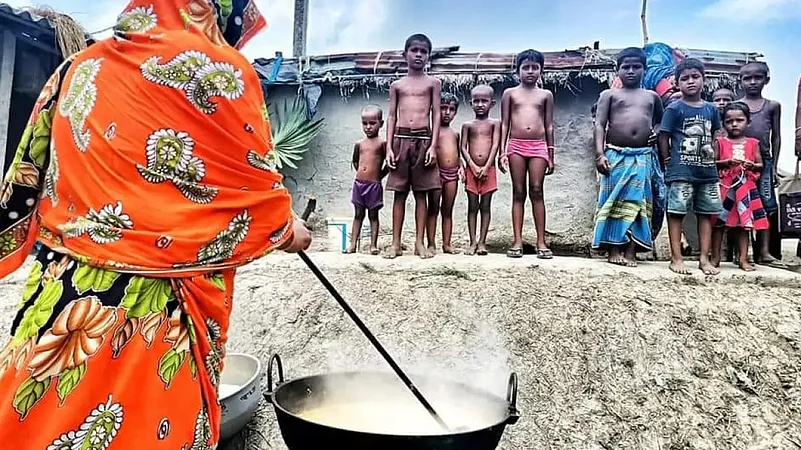In July 2015, while returning from his 8-year-old son’s birthday party, Chandra Sekhar Kundu was standing at a dump yard to dispose of the extra food and leftovers from the night. He had splurged on his son’s birthday party and at the end, there was a lot of food that had to be trashed.
Standing in the garbage dump, Kundu noticed a child rummaging for food and picking up bits of meat from a half-eaten Biryani meal, while another child stood at a distance with a lathi (stick) to fend off stray dogs and others from taking away their food. That night, Kundu brought the kids home and gave them food. However, the sight of the children was life-altering for him.
Disturbed, the next morning Kundu looked up on the internet to find out that one-third of the world’s hunger stems from India.
A 2018 report by Clean India Journal stated that around 67 million tonnes of food are wasted in India every year which has been valued at around 92,000 crores -- enough to feed all of Bihar for a year.
Concerned over the rampant food wastage in the country, Kundu had filed an RTI (Right to Information) with the Food Corporation of India (FCI). In response, he learned that food, worth Rs 88,000 crore, was wasted annually back then. Speaking to Outlook, Kundu said, “If we could even save 10 per cent of it, that would have been enough to feed one crore hungry children per month.”
Shook by the appalling figures, Kundu had written a letter to the then President Pranab Mukherjee and other officials, seeking measures for monitoring food wastage. However, not much was done about the wastage of cooked meals.
From there began the journey of Kundu’s efforts to save prepared food. And what began in 2016 as a food NGO, has now grown into a network supporting children's education and economic development through community kitchens.
“FEED (Food, education and economic development) has been more than a mere food NGO. It focuses on children’s nutrition and education and is now gradually venturing towards economic development,” says Kundu, whose initiative has now saved over 3,00,000 plates of wasted food.
Elementary days of FEED
A teacher at Asansol Engineering College, Kundu began his work in 2015 from his own campus. He started carrying tiffin boxes and containers to college, where he would collect the excess food from the canteen and feed them to the children living by the railway station.
Gradually when Kundu’s initiative started gaining popularity, he began investing in the venture to satiate the hunger of more children. However, for him alone, it was becoming a stressful financial event.
In 2016, when Kundu laid the foundation for FEED, many of his friends and colleagues came forward to help with the operations. Partnering with several educational institutions and corporates like IIM-Calcutta, Vesuvius India Ltd and CISF Barrack among others, FEED started collecting leftover food to redirect them to the poor.
But there was one problem -- collecting wasted food at night. “Often we saw, that the excess food from weddings and restaurants were handed over at night. That food could only be given the next morning and cold storage would be a recurring cost on our part. Hence, even with the initiative, we saw children in the areas sleeping hungry at night,” says Kundu.
It was then, that FEED decided to set up community kitchens to ensure proper intake of nutrition among children.
Saving children from malnutrition
In 2019, several children from Bihar were reported dead after they had consumed lychee during the summer season. While media reports claimed that they had developed Acute Encephalitis Syndrome (AES), medical experts stated besides AEP, the children would skip their evening meals and then eat the litchi in the morning. The Hypoglycin A and Methylene cyclopropyl acetic acid, which are naturally present in litchi fruit, caused a reduction in low blood sugar levels during the night. This often led to the death of the children.

Focusing on the need for evening meals, Kundu says, “When children go out begging, it’s not too difficult for them to arrange their lunch. They often manage that. What becomes challenging is arranging food for dinner. It’s here, where FEED steps in, ensuring that children get their night meals as they form a major part of children’s nutrition cycle.”
Tying up with Indian Paediatric Academy, FEED has been stepping into remote villages across West Bengal and Asansol to assess children’s health and nutrition. “Based on the assessment, we understand in which areas children need more nutrition. In those areas, we set up community kitchens to ensure that those children receive their dinner daily,” says Kundu.
Nutrition impacting education
“Simply feeding children is not enough. We have to do more.”
By and large, Covid-19 has caused an exponential rise in school dropouts across India and South Asian countries. UNESCO estimates that about 24 million learners, from pre-primary to university level, were at risk of not returning to school in 2020 following the education disruption due to Covid-19. Almost half of them are found in South and West Asia. On March 15, 2022, the Ministry of Education released a detailed Report on Unified District Information System for Education Plus (UDISE+) 2020-21, that showed the enrolment of students at the pre-primary level and class 1 has gone down by 29.1 lakh and 18.8 lakh respectively in 2020-21 from 2019-20.
While lockdown and the digital divide count as the primary reasons for school dropouts, Kundu also notes, how in rural areas, the differences in ‘social class’ affect children in dropping out. And mid-day meals, alone, at government schools, do not act as a strong incentive to attract these children to attend classes.
“Often we see, children from the most impoverished classes choose to discontinue education owing to social insecurities, lack of resources, need to earn a livelihood during school hours and so on. How do we ensure that these children are consistent with their education? Maybe through food,” says Kundu.

Across places in West Bengal’s Puruliya, Asansol and Sundarbans, FEED has opened 21 centres where these dropped-out children are given tuition classes in the evening, along with it food for the night. “The dinner often becomes a good incentive for children to attend the classes. And once they do, we groom them and help them catch up on the missing lessons at school, boosting up their confidence to attend school on a regular basis,” says Kundu.
Creating employment opportunities through food
FEED, which nearly has 65 active members, also provides women in rural and village areas with a source of livelihood.
“The food cooked at the kitchens is by the villagers themselves. In fact, if there are some parties or celebrations in a nearby village, we often get an invitation to provide food. This creates a chain of employment for those who are rendering their services as cooks,” says Kundu, adding, “The situation is very similar to that of the tuition classes.”
The educated youth of the village are often hired as teachers to give lessons to the students, allowing them to also earn a living for themselves through social work.
Promoting sustainability at weddings and celebrations
“In India, there’s this one perpetual problem: We never inform a host if we don’t want to show up for a wedding. We can save so much of food, right there,” says Kundu.
Indian weddings have long been a platform for showing social status with people spending lavishly on food and grandeur. However, little thought is given to what happens to the wasted food.
“Our next target is to make people aware that hosting parties and weddings in a sustainable way will help us prevent a lot of food wastage. Hence, invitees should inform beforehand if they cannot make it to the occasion,” says Kundu.
The shelflife of cooked meals is any day shorter than the raw ingredients and hence, Kundu believes that an RSVP system can help the country save tonnes of food every year at the big fat Indian weddings.
The crisis of India’s malnutrition among children has been attributed to years of poverty, food wastage, impoverishment and in recent times, Covid-19’s impact on economic activities. In 2021, the Women and Child Development Ministry revealed that over 33 lakh children in India are malnourished and more than half of them fall in the severely malnourished category with Maharashtra, Bihar and Gujarat topping the list. Standing at a juncture, where children are ruled by hunger, Kundu’s initiative to act on malnutrition and hunger raises questions about what we are doing with what we are wasting.


























